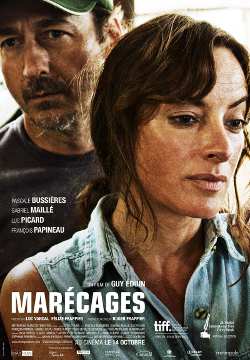
Pascale Bussières is a French Canadian actress.

Micheline Lanctôt is a Canadian actress, film director, screenwriter, and musician.
Streetheart is a 1998 film that was awarded the Crystal Globe at the Karlovy Vary International Film Festival in 1998. It was directed by French Canadian director Charles Binamé.

The Last Man is a 2006 Lebanese film by the Lebanese director Ghassan Salhab.
Marc Labrèche is a Canadian actor, comedian and host.
David La Haye is a Canadian actor.

Maryanne Zéhil is a Lebanese-Canadian film producer, director, screenwriter, and author. Born in Beirut, Lebanon, she has lived in Montreal, Quebec, since 1996.

Wetlands is a 2011 Canadian film from Quebec written and directed by Guy Édoin and starring Pascale Bussières, Gabriel Maillé, Luc Picard and François Papineau. It had its Canadian premier at the Toronto International Film Festival and its Quebec premier at the Festival de Cinéma de la Ville de Québec (FCVQ). Theatrical release was on October 14, 2011.

The Demons is a 2015 Canadian drama film, written and directed by Philippe Lesage.

Ensaf Haidar is a Saudi-Canadian human rights activist. Born in Jizan, Saudi Arabia, Haidar is the wife of Raif Badawi, a Saudi writer, dissident and activist who was sentenced to ten years in prison and 1000 lashes in 2014. She actively campaigns for his freedom. Haidar is the President of the Raif Badawi Foundation for Freedom, which actively campaigns for freedom of speech and human rights awareness in the Arab World. She ran as the Bloc Quebecois candidate in Sherbrooke for the 2021 Canadian federal election but was defeated.

The Heart of Madame Sabali is a 2015 tragicomic feature film by Canadian director Ryan McKenna. It stars Marie Brassard, Amadou & Mariam, Youssef Camara and Paul Ahmarani.
We Are Gold is a Canadian drama film, directed by Éric Morin and released in 2019.
Phantom Life is a Canadian drama film, directed by Jacques Leduc and released in 1992. An adaptation of the novel by Danièle Sallenave, the film stars Ron Lea as Pierre, an academic at the Université de Sherbrooke who is torn between his marriage to Annie and his extramarital affair with the younger Laure.
Wandering: A Rohingya Story is a Canadian documentary film, directed by Mélanie Carrier and Olivier Higgins and released in 2020. The film is a portrait of the Kutupalong refugee camp in Bangladesh, which houses a large number of refugees from the Rohingya conflict in Myanmar.
Love Project is a Canadian drama film, directed by Carole Laure and released in 2014. An ensemble drama, the film focuses on the professional and personal lives of a group of young theatre professionals who are working to produce a multimedia stage play.
The Valley of Tears is a Quebec film produced, written and directed by Maryanne Zéhil, starring Nathalie Coupal, Joseph Antaki, Nathalie Mallette, Sophie Cadieux, Henri Chassé, Wafa Tarabey, Layla Hakim and Janine Sutto. It is Zehil's second full-length feature film.
The Sticky Side of Baklava is a Quebec film recounting the story of a clash between Lebanese and Quebec cultures, as played out in the relationship between two sisters. It features Jean-Nicolas Verreault, Claudia Ferri, Raïa Haïdar and Geneviève Brouillette.
Frontiers is a 2023 Canadian drama film written and directed by Guy Édoin. The film stars Pascale Bussières as Diane Messier, a woman in the Estrie region of Quebec who has descended into anxiety and paranoia following a tragic accident, leading her mother Angèle to return from her retirement in Florida in an effort to help her.
Dounia and the Princess of Aleppo is a Canadian/French animated film, directed by André Kadi and Marya Zarif and released in 2022. The film centres on Dounia, a young Syrian girl who is leaving her hometown of Aleppo with her grandparents to find a new place to live following the outbreak of the Syrian Civil War.








